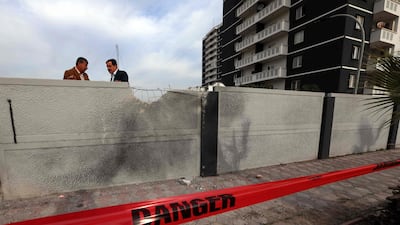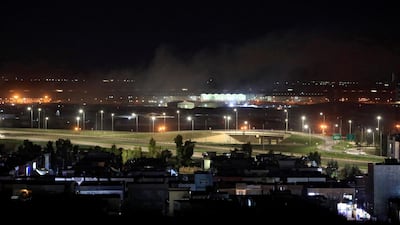In an overnight strike on Syria, US President Joe Biden delivered a resounding message to Iran and the wider region. Targeting Iranian-backed militias in Syria in a response to an attack in Iraq, Mr Biden made clear that his administration is willing to take military action when needed.
The strikes also made clear that regional dynamics were interlinked; Iran will not be seen in isolation from Iraq and Syria. Much of the 600-kilometre border between the two countries is no barrier to the movements of Iran-backed militias. The strikes in the early hours of Friday morning reminded those militias that their movements are being tracked.
While the features of the Biden administration’s Middle East policy are yet to be fully fleshed out, this first military strike under his tenure is a significant one.
Striking several facilities at a border crossing used by Iran-backed groups, Kataib Hezbollah and Kataib Sayyid Al Shuhada, active in Iraq and Syria under the directives of Tehran, reminds the militants that they are in the sights of the US military, even if there is a change of incumbent in the White House.
The decision to strike facilities in Syria, instead of Iraq, was wise. It indicates that US policy in Syria will not be limited to counter-ISIS activity. It also limits the political blowback the Iraqi government would have to deal with. While Iraqi Prime Minister Mustafa Al Kadhimi is keen to rein in the militias, if they are targeted in Iraq he would be put under great pressure from the militias and their backers.
Furthermore, Iraq is keen to de-escalate military actions before the visit of Pope Francis to Iraq next week. Mr Biden and Mr Al Kadhimi discussed the need to push back against the militias in a phone call on Tuesday night, emphasising the need to co-ordinate any response to the militias.
Of note is that the strikes were ordered on the same evening that Mr Biden called Saudi Arabia's King Salman. In that call, the American president reaffirmed his country's commitment to Saudi Arabia's security.
The White House read-out of the call stated that the two leaders discussed “the US commitment to help Saudi Arabia defend its territory as it faces attacks from Iranian-aligned groups”.
Again, the White House enunciated its intention to confront Iranian-back groups in the region in a public statement. This is a clear message to the region – particularly to Tehran and its proxies – that the Biden administration will not turn a blind eye to militia activity.
Iran's leaders should comprehend that the Biden administration's policy will not be confined to tackling its nuclear programme, as some of Tehran's supporters advocated.
The American response to last week’s attacks in Iraq is bold and measured. For it to have a long-lasting effect, this type of pressure on Iranian-backed proxies must be sustained and consistent.










